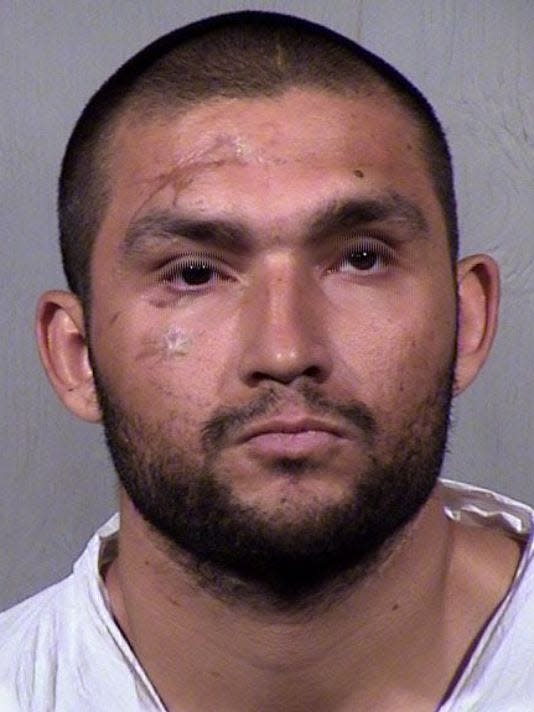Andrew Ward killed his brother and cellmate 10 years ago in Phoenix. Where is he now?
This year marked 10 years since the murder of a 12-year-old boy by his brother in Phoenix.
In March 2014, Andrew Ward called the police to turn himself in for stabbing his younger brother, Austin Tapia, at their home. The day before the murder, a child had called Phoenix police, expressing fear about a package Ward brought into their home.
Ward committed another murder less than a month later, killing his cellmate, Douglas Walker, in the Lower Buckeye Jail, which the Maricopa County Sheriff's Office runs.
Ward was sentenced to life in prison. He remains in custody in Arizona and has no chance of parole.
Here's what to know about Ward's case.
'Just felt like killing': Andrew Ward calls 911 after killing brother

On the evening of March 12, 2014, at about 5:30 p.m., Ward called 911 from a Circle K convenience store, reporting he had stabbed someone at a house off 35th Avenue south of Deer Valley Road in Phoenix.
During the call, Ward said there had been a murder, but he was initially hesitant to describe what happened. When pressed by the dispatcher, Ward admitted to stabbing Tapia in the chest, neck and head.
Police said he had been alone with Tapia, who decided to stay home while his mother and two sisters went out to dinner.
Police found Ward in the Circle K with a bloody knife and blood on his clothes. Ward told the dispatcher and police he "just felt like killing," according to a recording of the 911 call and court records.
Ward was taken into custody and charged with first-degree murder. Police said Ward had a history of addiction and mental health issues. Ward had a history of convictions for driving under the influence, resisting arrest, marijuana possession and assault, according to court records. Ward's family said he had a history of addiction, depression and violence in the home, according to court records.
What happened the day before Andrew Ward killed his brother?
On March 11, 2014, a child identified as Ward's sibling called 911 from their home, asking for police to come search Ward's room.
The child said their mother was also home, but Ward would not let anyone into his room. The child said Ward hadn't threatened or hurt anyone but had a history of mental health issues and came into the house that day with a box they thought looked suspicious. They were worried he had purchased a gun and requested an officer come check to be sure.
The child described Ward as "really mentally unstable" to the dispatcher.
"We're afraid he bought something that could possibly harm us," the child said.
The dispatcher said she could send an officer to talk to the family but couldn't guarantee police would search his room.
"He hasn't committed a crime, he's not threatening you guys, he's not doing anything," the dispatcher said. "He's just sitting in his room."
The child responded: "I guess I'll have to wait until he does something."
A recording of the 911 call circulated on social media in March, prompting people to wonder whether Tapia's murder could have been prevented if the dispatcher had taken more action. But Phoenix police told KPNX-TV in 2015 that while they wished for a different outcome in hindsight, the dispatcher could not have seen into the future and technically did her job by screening the call.
"Our operators 'screen' several million calls per year and follow our policies, directives and their experience to dispatch officers when they believe it is necessary," Phoenix police said in a statement sent to the TV station.
What happened after Andrew Ward was put in jail?
Three weeks after Ward was arrested in the murder of Tapia, while he was in pretrial detention, Ward attacked and killed his cellmate, 33-year-old Douglas Walker, who was awaiting sentencing on an armed robbery conviction.
The two men had been placed together in segregated custody after each told jail officials they feared for their safety. Walker was found dead in the cell about 7:30 p.m. on April 2, after other inmates alerted detention officers to a fight inside the cell.
Ward admitted to the attack, saying he suffocated Walker with a plastic bag, cut his throat with a plastic playing card, beat him, smeared him with peanut butter and stabbed him with a golf pencil.
Following the incident, Ward was put into isolation. The Maricopa County Sheriff's Office said he would not share a cell again.
Ward underwent mental health evaluations to determine if he was psychologically fit to stand trial and was eventually determined mentally competent. While he initially pleaded not guilty to the murders, he later pleaded guilty to both first-degree murder charges in August 2017 and was sentenced the next month to two life terms.
Where is Andrew Ward today?
In June 2024, Ward was being held under medium custody in a behavioral health unit of the Arizona State Prison Complex in Tucson, according to Arizona Department of Corrections records. Medium security allows inmates to be housed in a congregate dormitory or two-person cell.
Since being admitted to prison in October 2017, Ward has only had one disciplinary infraction, for assault on an inmate. That was in March 2019.
'Essence of evil': Repeat killer gets life sentence for murdering girlfriend in Tempe
Reach the reporter at christina.avery@gannett.com.
This article originally appeared on Arizona Republic: Andrew Ward: 10 years after murders of Austin Tapia and Douglas Walker
